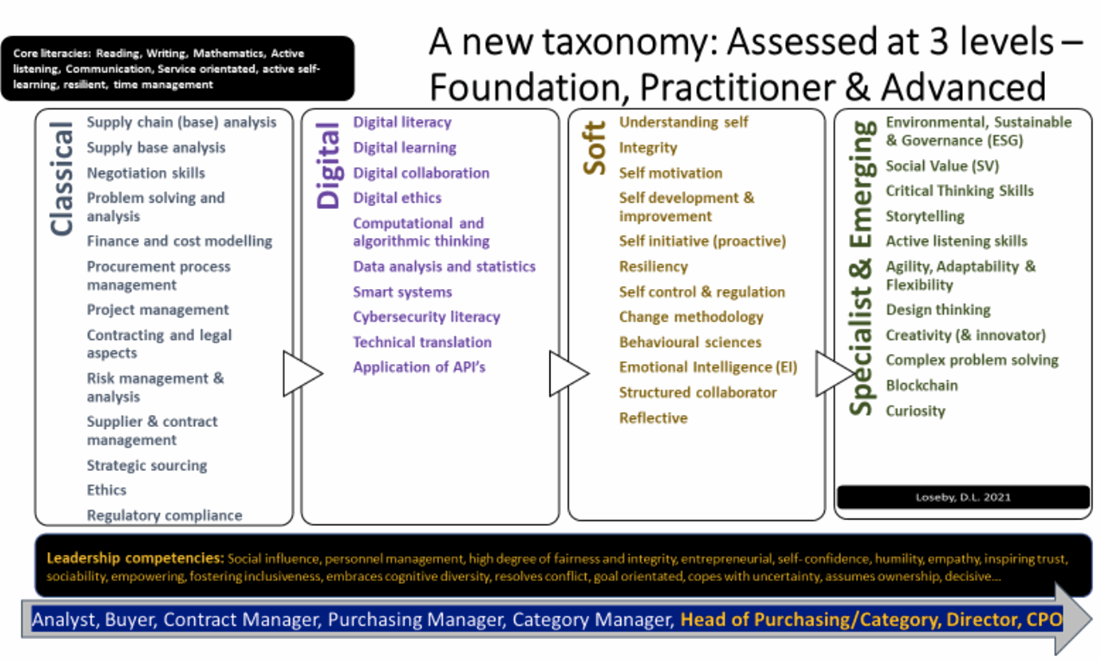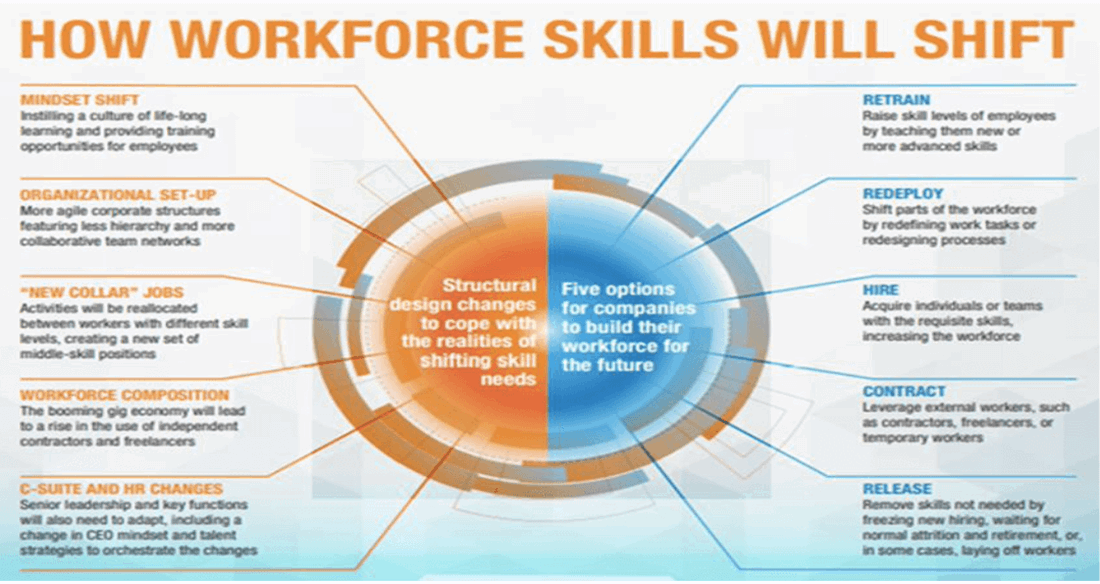Talent Mapping
Recognition of the talent needed to address an ever-increasing level of complexity within the procurement and supply chain management sector, is a fundamental part of connecting a motivational need to work and add value to an organisation. Any enterprise must consider where and how to apply skills, attributes, personalities, and diversities to maximise the inclusivity of any procurement team. The table below highlights the particular talents needed within the sector and where best to deploy them.

A new taxonomy for Procurement 4.0 (Loseby 2021)
The Procurement Agenda report by the Hacket Group in early 2022 highlighted the 61% shift towards the use of digital technologies. Further aligning skills and talent with changing business needs was a top ten priority for procurement in 2022 and will continue into 2023, especially with the increase in complex, global supply chains. Therefore, mapping talent should no longer be done by simply recognising the classical skills but should include other dimensions of culture and fit in a dynamic and ongoing basis.
A recent article by Joseph Fuller and Matt Sigelman “Manage Your Talent Pipeline Like a Supply Chain” resonated well and suggested three key areas of focus for employers:
-
Employers must work actively to draw from a broader talent base.
-
Employers must invest in “growing their own.”
-
Employers need to implement fundamental principles of supply-chain management.
In short declaring “A complex modern economy requires sophisticated, expertly managed supply chains. It’s time to start building a good one for talent”.
The Hackett report also recognised this in calling for organisations to be “Developing new capabilities to deliver on broader value expectations amid changing conditions”.
Recent Reports on the State of Skills
A recent Skill Dynamics report1 had some interesting survey data that should concern any organisation. According to research 27% of junior supply chain professionals plan to leave their role over the next two years, and almost as many junior procurement professionals 23% plan on doing the same. Therefore, over a four-year period, a supply chain and procurement organisation’s junior ranks will need to be replaced entirely and the skills and knowledge of those individuals will be lost!
In short, this precipitates into increased costs, reduced levels of customer service and disrupted supply chains, which puts your business at risk of compliance issues and financial and reputational damages.
A recent McKinsey report2identified the top ten skills as being the most critical to build. In short, organisations should reskill people as the antidote to talent loss by addressing this through reskilling programmes focusing on building employees’ skills in critical thinking, leadership and management, and advanced data analysis.
An MIT Sloan review3 stated that CPOs believe their organisations needs to develop employees with broad ranging skills. However, under half have enough specialist skills (data, soft, ESG). It also cited some interesting points too.
-
Rotation of assignments and roles
-
The use of AI and machine learning to uncover and develop new skills
-
Self-reporting of skills actually shows an underestimation of true capability
-
Embrace talent from all areas, not just STEM
-
Proactively look at future needs and prepare for them
Any organisation should consider more capabilities versus skills, as highlighted in a recent Deloitte report 4. These include a series of capabilities developed through experience and practice: adaptive thinking and critical thinking, teaming, social intelligence, sense making and emotional intelligence. There are also a series of innate capabilities that can be amplified to: imagination, empathy, curiosity, resilience, and creativity.
With the workforce shifting and research supporting a move towards less classical recruitment and retainment strategies, it is important to understand how this may affect your business and how we can expect this to change.

How to Improve Talent in Procurement
Understanding you need to update your approach to procurement and supply chain talent to match the changing needs of a digital world and all the associated technologies and platforms is the first step in ensuring the long-term benefits and better retention of a highly skilled workforce.
A Focus on Leadership
Of course, very little will change in terms of retention, development and upskilling without effective leadership, and this is a key factor in retention and attraction of talent. Further, one of the well- recognised factors of trust in and from your leadership comes through in research repeatedly and is emphasised in the research paper by Thompson in 20185. This is captured in the paper introduction; “Distrust in an organization, like de-motivation, has grave implications for organizational profitability and efficiency. Distrust affects an organization’s performance negatively as high levels of trust affect performance positively. The issue of trust, therefore, is a major bottom-line issue”.
Therefore, strong leadership and trust in your workforce can be a key element to improve your retention and will make your organisation a more attractive prospect to potential employees in the procurement sector.
Other Factors that can Improve Talent in Procurement
There is not just one factor that needs to change but rather a fundamental change in the culture and attitude throughout the entire recruitment process, reflected in procedures and policies. These include:
-
Hybrid working is fundamental part of the post pandemic era – Focus on outputs not physical presence.
-
Organisations need to sell themselves to candidates – it’s a 2-way engagement
-
Culture is a key dynamic – everyone needs to be authentic and approachable
-
Most, but not everyone wants/needs to be engaged in purposeful and stimulating work
-
Recognise people’s skills and align them well with the work
-
Team members need psychological safety. It is up to leadership to provide/facilitate this
-
Block out time to develop new skills and knowledge as part of BAU
-
Take time to develop the non-procurement skills too: storytelling, soft skills, stress management
Take Onboard Insights from Procurement Professionals
Expert advice can offer insights that speak from experience, depending on where organisations/teams/individuals are on the talent spectrum. Below is a summary of soundbites from a conversation with top professionals.
-
“Traditional working has now flipped”
-
“Job adverts are now positioned as hybrid working”
-
“Attracting top talent is not about paying big salaries but by providing the right culture,
motivating and purposeful work, with a genuine interest and plan for individuals” A
reflection that yes, we aren’t all motivated by the same things...
-
“Take an active role and ownership for engaging and finding the talent” - It is not a process
this is people’s lives and careers...
-
“Success is hiring people internally and paying the market rate too”
-
“If needed be prepared to exit senior people who are not motivated by supporting
individuals and are simply a blocker”
-
“There are no quick fixes to building high performing teams, it is often a journey over several
years”
-
“Make time for people as their wellbeing is key to performance”
-
“Create the ‘gaps’ in peoples diaries to make personal development happen” Effect and amnesty of commitments to prioritise upskilling
-
“Measure behaviours and not just results”
Conclusion
A raft of research points to ensuring that organisations need ESG, sustainability and social value credentials to attract and retain talent. This is especially important as we move towards more sustainable supply chains and a greener world.
Others have suggested valuing and supporting your employees through a more personal approach that addresses psychological safety. Recognising the importance of developing and engendering ethical and safe conversations on topics that are not procurement, but people related topics is best practice no matter the organization. Aspects such as mental health and wellbeing, resiliency, burn- out, stress, and other topics are essential to healthy and motivated teams.
However, the reality of course is that your organization will need all these as well as an acute sense of flexibility and agility on the part of leaders to ensure that they have the pulse of their people, business, and economic environment in order to be truly effective.
References
1Breaking the skill loss cycle – Skill dynamics October 2022
2Beyond hiring: How companies are reskilling to address talent gaps – McKinsey 2020
3Supply chain Leaders, Prioritise these three talent strategy essentials, Oosterhuis and Renker, October 2022. MIT Sloan Management Review
4Deloitte Insights, Skills change, but capabilities endure, John Hagel, John Seely Brown, and Maggie Wooll. 2019.
5Thompson, C.S., 2018. Leadership behaviours that nurture organizational trust: Re-examining the fundamentals. Journal of human resource management, 21(1), pp.28-42.
Professor David L. Loseby MCIOB Chartered, FAPM, FCMI, FCIPS Chartered, MIoD, FRSA













